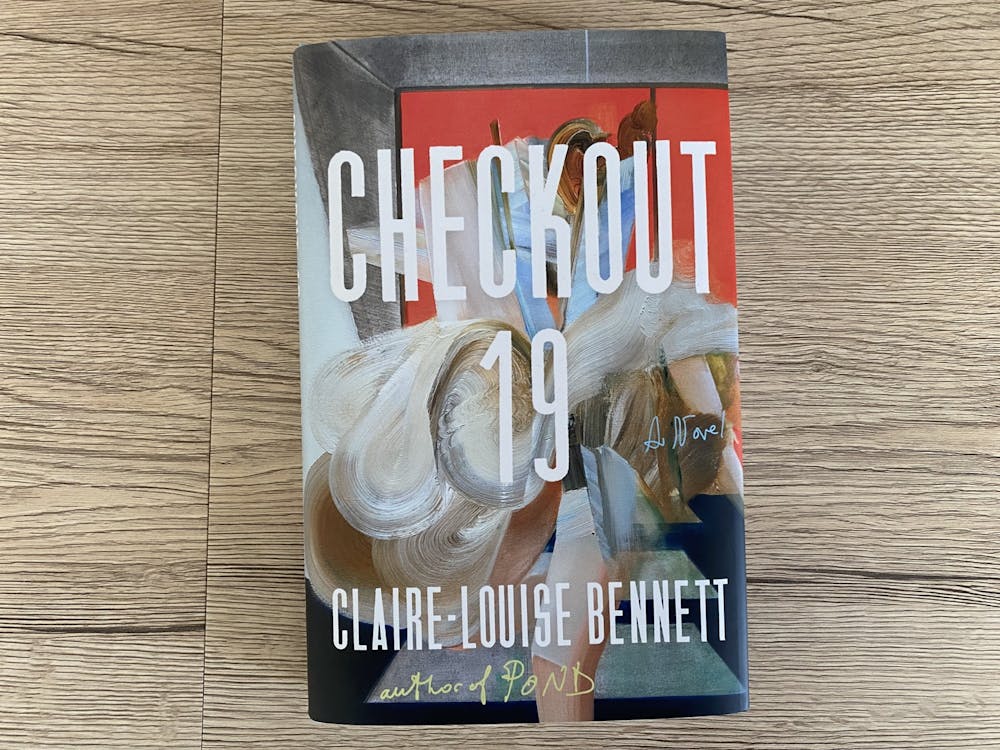Never have I ever met a book-lover who didn’t enjoy books written about books. Personally, right now as I write this column, I can see four such novels in stacks around my room without even moving from my desk. It’s a kind of meta endeavor — to wax poetic about the medium you are using. It offers a concentrated look into why literature matters.
Claire-Louise Bennett’s “Checkout 19” breaks the typically straightforward style of writing about writing. In covering literature, she writes about life, using a stream of consciousness style and strange narration comparable only to novelist Clarice Lispector.
“Checkout 19” is built of long, winding sentences that jump topics and key details. The narrator reflects on formative parts of her life, but readers for the most part cling to the periphery, trying to keep up.
The novel, Bennett’s second, begins in the plural first-person point of view, a mildly disconcerting orientation right away.
“Later on we often had a book with us,” Bennett writes. “Later on. When we were a bit bigger at last though still nowhere near as big as the rest of them we brought over books with us. Oh loads of books.”
She seems to use punctuation on a whim and follows a talking-aloud-to-herself style, assuming the audience already has the prerequisite background to make some of her rambles sensical.
The lack of details about the protagonist — potentially an authorial self-insert — is often a decidedly intentional choice for writers. It allows readers to imagine the diary-adjacent stories could happen to anyone, anywhere, anytime.
Seconds later, though, the work catapults into hyper-specific, highly detailed portraits with little transition from the assumed ambiguity.
Readers, for example, are introduced to Tarquin Superbus, a character of the protagonist’s own making. He might live in Venice or Vienna, Bennett supposes, before slipping into a bright vignette of the time he ordered hundreds of books for his library to be thought of as an intellectual only to find the town laughing at him, for all the books had blank pages.
Somewhere in this collection of empty books is a single sentence.
“And this one sentence contains everything,” Bennett writes in this section, nodding to the importance of sentences. “Everything. Whoever comes upon it undergoes an immediate and total awakening.”
Bennett, a reputed master of the sentence, is not worried about accessibility in this novel, dropping dozens of words I have ever seen used before in each chapter.
Her diction is most accessible to a highly educated audience, and her topic is geared toward a well-read one. She offers no introductions to the titles and authors she references, assuming readers will be as familiar with Witold Gombrowicz, Milan Kundera, Fernando Pessoa, Robert Walser and Françoise Sagan, for example, as they are with the colors in the rainbow.
Transcendental essayist Ralph Waldo Emerson’s famous reflection comes to mind for me: “I cannot remember the books I’ve read any more than the meals I have eaten; even so, they have made me.”
Bennett exists in opposition to Emerson here, listing dozens of books in single pages.
“One of the first serious works I ever read was The Tin Drum by Günter Grass and I got that from the library and it was a very big book and I read during that week or so when my bedroom was being painted and I slept in the spare room on a sofa bed,” Bennett writes, showing her ability to orient herself in her past through the recollection of what she was reading at the time.
“Checkout 19” explores identity formation through works of literature. If readers can adapt to Bennett’s perhaps off-putting, but freshly distinct style, they’re bound to learn something. If they can glean no other life lessons, they will, at minimum, become acquainted with the names of hundreds of international literary figures.




